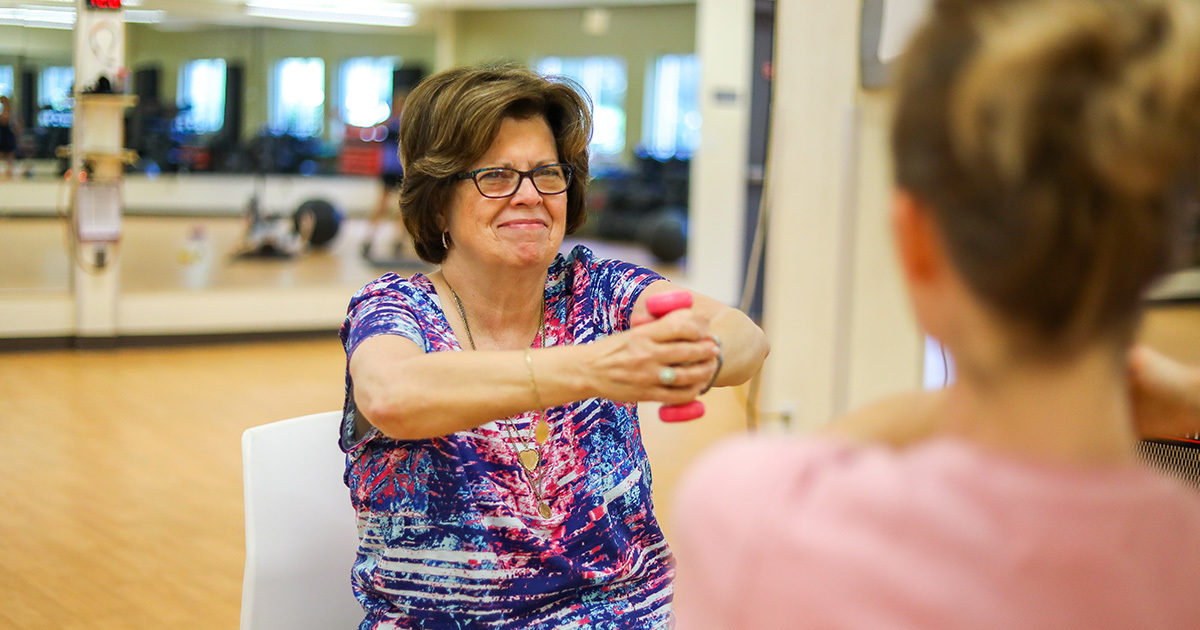UT Health Austin Patients Inspiring Optimism Every Day
Reviewed by: Multiple Sclerosis and Neuroimmunology Center patient, Nan Duhon
Written by: Lauryn Feil

In 1995 Nan Duhon was changing jobs and finishing up her master’s degree when she began showing symptoms that made her unsure of what was happening in her body. “I started experiencing things like numbness and tingling in my hands as well as speed and balance issues,” she explains, “I really just wanted to figure out what was going on.”
After seeing numerous doctors in Houston, it wasn’t until three years later that a specialist in multiple sclerosis (MS) was able to give her a definitive diagnosis. “It was difficult at first. Even living in Houston, where I had access to the Texas Medical Center, the largest medical center in America, I still had trouble finding a doctor that really could explain the cause of my symptoms to me,” says Nan.
Multiple sclerosis can sometimes be difficult to diagnose as it manifests differently in each individual. The body’s immune system attacks the central nervous system causing inflammation that damages the outer sheath that protects the nerves. Common symptoms can include fatigue, imbalance, weakness, numbness, cognitive dysfunction, and more.
Since receiving her diagnosis in 1998 Nan says she has always had a very positive attitude about living with MS. She explains that used to tell her husband, “you just can’t let the disease own you.” Through the years, Nan managed her condition successfully with her neurologist while continuing to work full-time and enjoying career growth and success in the medical field as a major gift officer and development director.
In 2017, Hurricane Harvey hit Houston, affecting millions of people. Nan and her husband were forced from their home due to severe flooding and ultimately decided to move to their vacation home in New Braunfels, TX, where she retired from working full-time. “The plan was always to move to New Braunfels to retire,” says Nan, “the flood, however, expedited that process.”
While flares and triggers may be different for everyone with MS, stress and environmental factors may become catalysts that can trigger or worsen the disease’s symptoms. Unfortunately, due to the stress of losing their home in Houston, Nan slipped into a relapse, and her MS symptoms grew worse. While dealing with the flood, navigating retirement, and moving to a new home 200 miles away from her friends, family, and doctors, Nan ultimately lost mobility in her legs. “It was extremely difficult; it still is difficult,” Nan admits.
But having a support system you can lean on is something Nan credits the most in keeping her positive even through some of her toughest times. Before leaving Houston, Nan’s neurologist retired, and her care was transferred over to neurologist Léorah Freeman, M.D., Ph.D. “I met Dr. Freeman, luckily, through my old neurologist, and I just loved her,” says Nan.
Dr. Freeman specializes in the care of people with MS, neuromyelitis optica (NMO), and other neuroinflammatory conditions of the central nervous system. She believes in personalized care, and incorporates holistic approaches, such as nutrition and exercise, into her treatment plans. Dr. Freeman was previously practicing at UT Health Houston but is now a part of the UT Health Austin Multiple Sclerosis and Neuroimmunology Center in the Mulva Clinic for the Neurosciences.
“When I moved to New Braunfels, Dr. Freeman was still practicing in Houston at the time, but when my relapse hit, she was always available. I could call her anytime, and she would answer all of my questions. Her level of personalized care and caring is extraordinary,” says Nan.
Taking personalized, whole-person care to the next level, Dr. Freeman also created and expanded her Moving Stronger exercise program to Austin in partnership with the Townlake YMCA. This program is designed specifically for patients with MS to help them safely stay active.
“The exercise program was such a wonderful idea,” says Nan. “It’s more than just getting out and staying active; you also build camaraderie with the other participants who have MS, too, and that exchange of information and the support we give each other, that’s invaluable.”
Dr. Freeman’s move to Austin meant that Nan could continue her care with her here at UT Health Austin, but their relationship encompasses more than just a few doctor’s visits a year to make sure everything is under control. They both talk about the mutual respect they have for one another, the inspiration they give each other, and the friendship and trust they’ve built.
“You see, now I’m starting to get choked up because you feel like your body abandons you in a way. My mind is working perfectly fine; it’s just my body that isn’t working for me anymore. And Dr. Freeman, she makes you feel optimistic about it, she truly inspires optimism,” says Nan.
When asked what advice Nan has for others with MS, she made a few key points:
- Take charge and be empowered with information about MS so you can manage your health to the best of your ability.
- Find a neurologist who specializes in MS as they are often more well-versed in the disease itself.
- Be sure to keep your support tools in place, whether it’s friends, family, doctors, or exercise groups, everyone needs support from time to time.
- Find ways to manage stress and other factors like diet that can affect or trigger symptoms. Nan suggests the book by Terry Wahls, MD, called The Wahls Protocol, as well as The Swank MS Diet, but always talk to your doctor about what might be best for you.
And another point she adds for others who may not be as familiar with MS:
- MS is an invisible illness, so practice sensitivity towards other human beings, you never know what they may be battling on the inside.
For more information about the Multiple Sclerosis and Neuroimmunology clinic in the Mulva Clinic for the Neurosciences or to make an appointment visit here or call 1-833-UT-CARES.